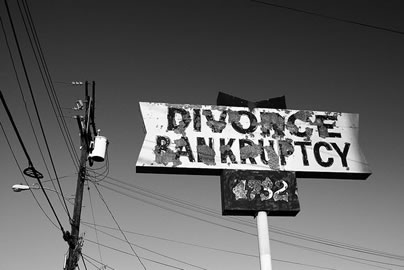 Unfortunately for most people, when they consider filing for divorce there is usually financial stress lurking, so they also consider filing for Bankruptcy. Trying to figure out which should be filed first, and how they affect each other can be a little confusing, and there are many factors to consider before making a decision.
Unfortunately for most people, when they consider filing for divorce there is usually financial stress lurking, so they also consider filing for Bankruptcy. Trying to figure out which should be filed first, and how they affect each other can be a little confusing, and there are many factors to consider before making a decision.
How Can Filing For Bankruptcy & Divorce Affect Each Other?
One rule of thumb to remember is that Bankruptcy takes precedence over a Divorce, meaning that the Bankruptcy will have to be completed before the Divorce is final. It’s impossible to do both “at the same time”. It’s also important to note that Bankruptcy Courts treat your income differently based on whether you are married, single or divorced.
Filing For Bankruptcy First
Filing for a Joint Bankruptcy may benefit both parties, but can only be done before a divorce. This may not be an option in some situations however. Filing jointly will address all of your and your spouse’s debts in one Bankruptcy case, and may increase the amount of your exemptions. There are two types of Bankruptcy that can filed for: Chapter 7 or Chapter 13. If you are eligible for Chapter 7 Bankruptcy then you should be finished in about 90 days, and eliminate any fighting over debts.
If you or your spouse files for Chapter 13 Bankruptcy, you will both be responsible for the repayment plan, and may be prevented from dividing your assets.
Filing For Divorce First
Filing for Divorce before you file for Bankruptcy can be beneficial if, together, your income is too high to quality for a Chapter 7 Bankruptcy. If you don’t qualify for a Chapter 7 Bankruptcy when filing jointly, you both may still be able to file for Chapter 7 after the Divorce is complete, and avoid a Chapter 13 repayment plan.
Another reason to file for Divorce first is that the Bankruptcy Courts will allow support considerations (child support, etc). If you know the amount of support you will be paying before filing Bankruptcy you will avoid having a repayment plan based on income that you don’t really have.
In conclusion, our best recommendation is to discuss your options with a credible lawyer before any decisions are made. They will be able to dive deeper into the subject and answer any questions that may arise along the way.






